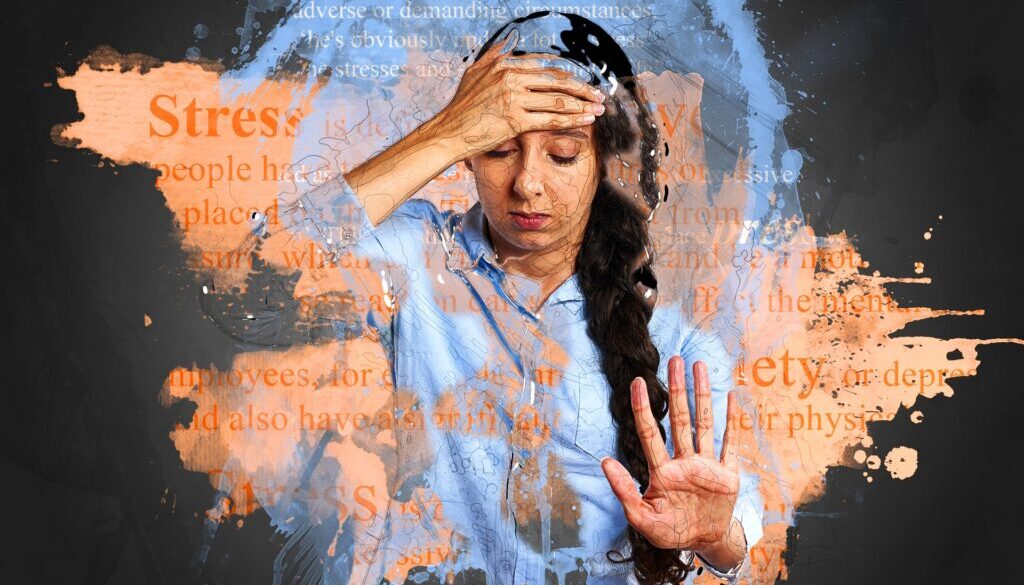April is Stress Awareness Month
By Aparna Mele MD
Stress Awareness Month has been recognized every April since 1992, and these last 2 years seem particularly important. Lack of support can cause loneliness and isolation, which in turn lowers people’s wellbeing, impacts mental health and can lead to mental illness. Social isolation is therefore an important risk factor for both deteriorating mental health and suicide. As we emerge from the pandemic, it’s vital that the community support experienced by many people during this challenging time continues. Although restrictions have mainly been lifted, people need support now more than ever as they adjust to a new way of living. Stress Awareness Month was created inform people about the dangers of stress, successful coping strategies, and harmful misconceptions about stress that are prevalent. This month reminds us to pay attention to our health!
Stress refers to how your brain and body responds to changes and challenges. Stress is the physical or mental response to an external cause; a physical, mental, or emotional strain or tension. A stressor may be a one-time or short-term occurrence, or it can happen repeatedly over a long time. In contrast, Anxiety is your body’s reaction to stress and can occur even if there is no current threat.
While it can be helpful to have a small degree of stress to keep you alert, motivated, and ready to avoid danger, chronic stress can have detrimental effects on your mind and body, especially when it is not managed properly. Long-term stress can prove to be more than just a mental issue. From headaches to insomnia, stomach disorders to depression – even very serious issues like stroke and heart disease can arise as a result of stress. A recent survey found that about two-thirds of U.S. workers report engaging in behavior such as drinking or crying regularly in order to deal with stress. Stress can be sickening—literally!
You can improve your overall well-being by learning to identify the signs and symptoms of stress, understanding how it affects your health, and finding constructive ways to manage it. Common reactions to a stressful event can include: being overcome with disbelief, shock and numbness; feeling sad, frustrated and helpless; having difficulty concentrating and making decisions; experiencing headaches, generalized pain, racing heartbeat, and stomach problems; having difficulty sleeping and/or having nightmares; noticing changes in appetite, energy, desires, and interests; witnessing a worsening of chronic and mental health conditions; and increasing use of smoking, alcohol and other drugs.
This chart provides a nice overview of both stress and anxiety and how they relate and deviate.
| Stress | Stress and Anxiety | Anxiety |
|---|---|---|
|
Both stress and anxiety can affect your mind and body. You may experience symptoms such as:
|
|
**Source: https://www.nimh.nih.gov/health/publications/so-stressed-out-fact-sheet
Learning healthy ways to cope and getting the proper care and support can help reduce stressful feelings and symptoms. Adapting to and coping with our stress by finding healthy ways to deal with these situations can go a long way in living a healthy and positive life.
Strategies to handle stress include:
- Eat health, well balanced meals
- Prioritize restful sleep
- Exercise regularly which sheds harmful stress catecholamines and releases feel good endorphins into your bloodstream. Research has shown us that Vitamin D intake can help improve mood and reduce anxiety. Spending some time outdoors every day gives you fresh air and interaction with nature, which is extremely therapeutic. Whether you’re a jogger, bicyclist our just like to take long walks, be sure to get some fresh air and exercise into your daily routine
- Prioritizing restful sleep and stick to a sleep routine
- Keep a journal.
- Download an app that provides relaxation exercises (such as deep breathing or visualization) or tips for practicing mindfulness, which is a psychological process of actively paying attention to the present moment. Practice meditation to silence the mind
- Identify and challenge your negative and unhelpful thoughts. Being in control of your thoughts increases your ability to find solutions to challenging situations and to deal more effectively with stress
- Adopt positive affirmations which can be a powerful tool in transforming the negative power of the little voice in your head and turning it into a positive, motivational and affirming chant instead!
- Say no to things you do not want to do, need to do, or have time or energy to do
- Plan stress relieving outlets that give you joy and turn your mind and thinking away from the stressors you are dealing with
- Connect with others and keep in touch with people who can provide emotional support and practical help.
- Talk to your doctor or healthcare professional about stress. Start the conversation and get proper care for existing or new health problems.
Engage with others and open conversations about stress and its effects on all of us. Help to reduce the stigma and freely share your coping mechanisms with others. It might benefit someone who you care about and also take your focus off of your own personal challenges. Be kind to others who are experiencing stress and anxiety and treat them with compassion and empathy to help them overcome it. Most importantly, look after yourselves and prioritize self-care by taking time out of your day for you to relax or engage in something you enjoy. Together as a community, we can overcome stress and emerge stronger!



